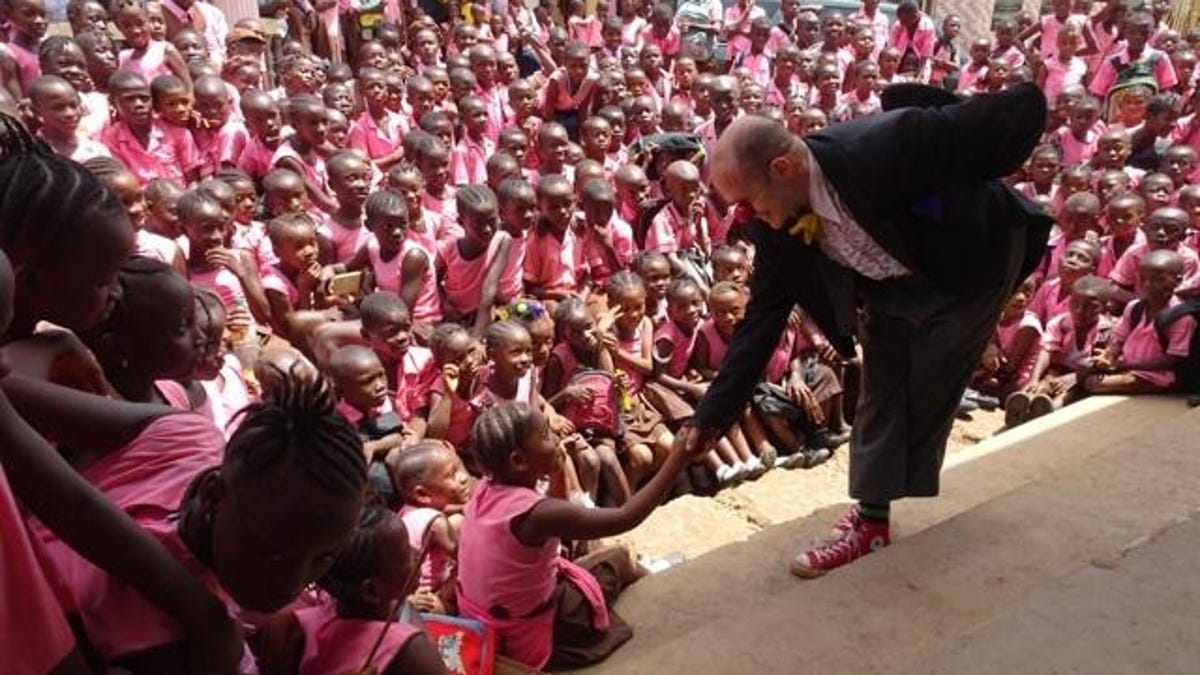In Ebola zone, clowns play to audience of phones
Commentary: A Clowns Without Borders performer who brings cheer to global crisis zones sees how connectivity impacts performance -- and human suffering.

Tim Cunningham, a volunteer with Clowns Without Borders, greets a crowd in Sierra Leone, a country hit hard by the Ebola outbreak.
The Muslim spiritual leader requested a performance at 2:30, after noon prayers. I showed up strumming my banjulele, wearing a wool tuxedo, tails too wide and too long, gray banker pants too tight and too short, red Converse all-stars and a bowler hat that said I meant business.
Every clown needs a bowler hat.
I'm a volunteer with Clowns Without Borders USA, part of an international organization that believes in the power of laughter to instill resilience in those facing crises like civil war and natural disasters. We'd been invited to Sierra Leone to perform for communities affected by the massive West African Ebola outbreak that spanned from late 2013 to early 2016 and claimed an estimated 4,000 lives in the country.
Clowns Without Borders believes in the power of laughter to give resilience to people who've suffered.
On a rainy day in June, World Refugee Awareness Month, I led a procession of clowns (not the scary kind) through muddy Freetown ditches and past shacks housing 10 people or more. A crowd of 300 smiling adults and children surrounded the imam's house, some sitting, others perched on cars or peering at us from inside the house's open windows.
I'm a graduate of the Dell'Arte International School of Physical Theatre in Blue Lake, California, and this was my 22nd trip with CWB since 2003. During visits to 11 countries including Turkey, Haiti, South Africa and Colombia, I've performed as warplanes flew overhead, been chased off stages by goats and welcomed by tribal chiefs. On this afternoon in Sierra Leone, I saw something that's both totally ordinary in this day and age — and extraordinary.
A 6-year-old girl in a black sequined hijab leaned out a window to watch us perform. As the show began, I walked her way to tip my hat -- the clown must acknowledge the whole crowd. She laughed, then ducked behind a curtain. The cloth was thin enough that I could see her silhouette behind it. And then, her face was replaced by the back of a smartphone. She quickly came out from behind the curtain, but playfully hid every time I looked back at her.
The phone, however, didn't budge the rest of the show.
Bruised ego, full heart
In 2015, I performed at a refugee camp in eastern Turkey for Yazidi families who'd escaped systematic slaughter by ISIS. The audience was full of women and children (most of the men had been killed) -- and smartphones. There were so many phones being used to record the show and tweet and text images to friends that I struggled to feel genuinely connected to the audience.
For more than a decade I'd performed for people who've experienced unimaginable trauma. I was used to seeing faces: hundreds of smiles, eyes trained on juggling clubs flying through the air and jaws wide at the sight of a magic disappearing handkerchief. People watched our shows transfixed and unimpeded by technology. Then -- phones blocked the smiles.
Two years later in Sierra Leone, I found myself performing for as many phones as people. My ego was a little hurt, but my heart was lifted.
Ubiquitous phones in these two settings say a couple of things. First, though the media often portrays refugees as decrepit, hungry and desperate, the Yazidi families we met in Turkey had been as wealthy and successful as my peers in the medical profession (far more wealthy than us clowns). They were professionals -- nurses, doctors, businesspeople -- who were forced to flee their homes at a moment's notice simply because of where they were born.
Second, everyday technology can have a profound impact.
Smartphones saving lives
In his book "Ebola: How a People's Science Helped End an Epidemic," anthropologist Paul Richards reflects on how local expertise and common sense may have done more to successfully curb the Ebola outbreak than most large-scale, multimillion-dollar NGO interventions. The simple use of mobile technology allowed people quarantined in homes to communicate with the outside world, describe what they saw and ask for the help they needed.
Even in the poorest neighborhoods we visited in Freetown, everyone had a phone. Most had smartphones. Communication saved lives during the Ebola crisis. Sharing stories, images and videos with the press of a button allowed communities ravaged by the virus to maintain some semblance of normalcy. Similarly, mobile technology in the Yazidi camps of Turkey helped those who'd lost everything hold onto something, and record and share it. It's a lifeline the CNET News team observed repeatedly while reporting for Life, Disrupted, a 2016 special series on tech and the global refugee crisis.
At the end of our Sierra Leone show, we kicked off a lively dance party and let the smallest and youngest audience members climb atop our shoulders and look out over the cheering crowd. I turned back to the girl in the window. She saw me and waved. I walked over to her, and this time she didn't run. She put her phone down, reached out her hand and gave me a high-five.
Then, as I walked away, she picked up her phone again. I'm pretty sure she pressed "send."
Tim Cunningham is a volunteer with Clowns Without Borders USA and its former executive director. He's currently completing a doctoral degree at Columbia University's Mailman School of Public Health, and aspires to bridge laughter, health, joy and play.
Life, disrupted: In Europe, millions of refugees are still searching for a safe place to settle. Tech should be part of the solution. But is it? CNET investigates.
Batteries Not Included: The CNET team shares experiences that remind us why tech stuff is cool.